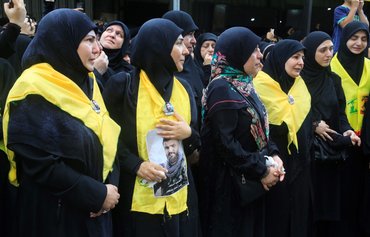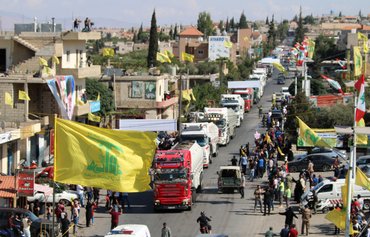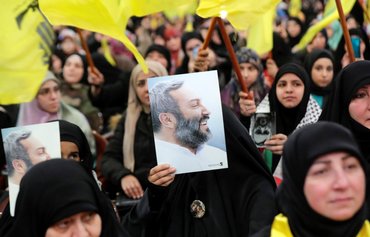BEIRUT -- Disenchantment with the so-called party of "resistance" has been on the rise within the Lebanese Shia community -- Hizbullah's traditional base -- amid signs that party leader Hassan Nasrallah's appeal is fading.
Lebanon's Shia community has come to understand the full extent of Hizbullah's corruption, including its role in smuggling government-subsidised fuel to Syria, Lebanese Shia who are opposed to the party told Al-Mashareq.
There has been an unprecedented rise in popular discontent with Hizbullah as Lebanon's gasoline crisis has crippled the country, according to Shia Reform Movement member Hussein Ezzeddine.
The way the party has conducted itself during the gas crisis has damaged its standing in the community even more than the popular demand for its disarmament, he said.
![Lebanese protesters in southern Lebanon are demanding an end to the political elite and its corrupt practices. [Al-Mashareq]](/cnmi_di/images/2021/07/21/30835-leb-hizb-protest-600_384.jpg)
Lebanese protesters in southern Lebanon are demanding an end to the political elite and its corrupt practices. [Al-Mashareq]
![Drivers wait in line to fill up their tanks with gas in southern Lebanon in the midst of fuel shortages this month. [Al-Mashareq]](/cnmi_di/images/2021/07/21/30836-leb-gas-crisis-600_384.jpg)
Drivers wait in line to fill up their tanks with gas in southern Lebanon in the midst of fuel shortages this month. [Al-Mashareq]
He pointed out that the party tried to attribute the gas crisis to corruption, blaming its ally, the Amal movement, which sparked resentment among the country's Shia communities.
Adding to the resentment and tensions, the crisis has been handled poorly in Hizbullah-controlled areas, he said.
The Shia community contends the reason for the gasoline crisis is that "Hizbullah directs the process of smuggling this commodity into Syria", Ezzeddine said.
Evidence of this came to light when the people of the southern town of al-Bissariya "discovered that the father of party official Sheikh Abbas al-Shami was stockpiling gasoline and refusing to dispense it to residents", he said.
Party officials claimed the gasoline stockpile "was reserved for 'jihad', in case Hizbullah would need it", he said.
Party's appeal fades
Ezzeddine said he senses Nasrallah's prestige has faded among the party's base.
People feel that Nasrallah's "victory speeches" have turned into "boring political talk that has nothing to do with crisis resolution", he said.
The party's traditional base "has lost its confidence in Nasrallah", who is no longer seen as capable of combatting corruption or of resolving the coronavirus crisis, despite his ties to the minister of health.
A Hizbullah opponent in the Bekaa Valley, who wished to speak on condition of anonymity, agrees, saying that Lebanon's economic crisis has had a devastating effect on Hizbullah's base.
"The discontent that is being manifested day after day among the party's supporters has affected its internal policy," the Shia dissident said.
A new class of Hizbullah elements has emerged in the Baalbek-Hermel region, where the party is influential, "who are indifferent about high prices because they receive their salaries in dollars", he noted.
This has fueled resentment between the party's longtime supporters and the new wealthy class of elements, "resulting in daily insults toward Hassan Nasrallah and his officials", he said.
Many Hizbullah supporters now realise the party is behind the smuggling operations through illegal crossings in Baalbek-Hermel, and that it directs these activities from Brital, Maarabon, Harbata, Hermel and al-Qasr, he added.
Resistance to Hizbullah
As Hizbullah's ploys and deception are laid bare, dissatisfaction with the party is growing among the country's Shia, according to political analyst Tony Boulos.
People are no longer fooled by the labels it has assigned itself, he said, such as calling itself the party of "resistance" and pledging "to lift the grievances of the Shia community".
These have "proved to be phony slogans" aimed at misleading Lebanese Shia and steering them towards the party's extremist ideology, he said.
But although the party has fewer weapons in its possession that it once did, it still has enough military might to stifle internal opposition and hold the Shia community hostage, he said, just as it has done with Lebanon's economy.
Boulos said there are several influential Shia groups that are not inclined to support Hizbullah. But these groups are in need of leadership, organisation and solidarity to resist the party.
"The Shia community is no longer convinced of Nasrallah's rhetoric and justifications... in light of the state's collapse," he said. "But Hizbullah is still able to control the Shia with its weapons and the benefits it provides them."

![Demonstrators in southern Lebanon have broken the barrier of fear and are now protesting against Hizbullah, raising slogans condemning the corruption sponsored by the party. [Al-Mashareq]](/cnmi_di/images/2021/07/21/30834-lebanon-protest-hizb-600_384.jpg)






